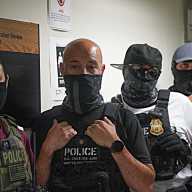By ED KOCH
“Valkyrie” (-)
The person in charge of this historical film, and most believe it was Tom Cruise, took what should have been a thriller and created a dull movie. The story is modeled on a true attempt to assassinate Adolf Hitler. How could this subject matter be presented is such a blasé manner?
About a year before World War II actually ended, many in the German high command knew that defeat was in sight. This was particularly true because of the great counterattacks mounted on the eastern front by the Soviets and, of course, the Normandy Invasion by the American and English armies. Col. Claus von Stauffenberg (Tom Cruise) is a German war hero who suffered the loss of an eye, one hand, and the fingers on his other hand, during the war. Wanting to achieve the best possible terms in defeat, he decides to overthrow Hitler and put the Wehrmacht, Germany’s armed forces, in charge. The plot is referred to as Operation Valkyrie.
Stauffengerg’s attempt to kill Hitler (David Bamber) in his bunker on the eastern front, referred to as the Wolf’s Lair, is unsuccessful. The coup is put down and the hordes of Wehrmacht officers who were part of the plot are arrested and executed either by garroting (hung by a wire on a hook and left to slowly and painfully strangle) or by rifle execution. In some cases, the arrested were allowed to shoot themselves.
The director of a film, in this case Bryan Singer, would normally be held responsible for removing all vitality from a movie that should have reeked of excitement, even though the audience knows the outcome of the plot. In this case, however, because Tom Cruise is so overwhelming in his off-screen appearances, many people, including me, concluded that he was the villain.
Other actors in the film, none of whom distinguished themselves, include Kenneth Branagh, Bill Nighy, Tom Wilkinson, Carice van Houten, Thomas Kretschmann, Eddie Izzard, Kevin McNally, Jamie Parker, Christian Berkel, Tom Hollander, David Schofield, Kenneth Cranham and Halina Reijn.
The movie is primarily in English, intermixed with occasional subtitles. The attempted German accents of the actors were sometimes disconcerting and lent themselves to buffoonery. Overall, I found the picture to be a disappointment.
“Waltz With Bashir” (+)
In earlier days this movie would have been referred to as a cartoon. The long road of cartoons has culminated in animated films in which far better drawings are accepted as real screen images by the audience. The Israeli have taken the art of animation and reality to an even greater level in this picture.
The story is about the Israeli invasion of Lebanon in 1982. No attempt is made to explain why the invasion occurred. As I recall, it resulted from the incessant attacks upon northern Israel initiated by the PLO which had established itself as an independent body in Lebanon led by Yasir Arafat.
The film focuses on a massacre by Christian Arabs against the PLO. The Christian Arabs’ military force was known as the Phalange. The Christian Maronites were a minority in Lebanon with greater political power than their numbers would dictate. The massacre took place in two major refugee camps occupied by PLO families in Lebanon: Sabra and Shatila. Throughout history the Roman Catholic Maronites and the Muslims had killed one another when the opportunity presented itself. Here the Maronites used the invasion by the Israeli to seek their latest revenge killing hundreds of PLO Muslim children, women and men in the two refugee camps, with methodical shootings and throat cuttings.
The Israeli were blamed by their political enemies throughout the world for encouraging the massacre. Time magazine blamed then Israeli Defense Minister Ariel Sharon for encouraging the deaths of the civilian PLO families by his Maronites. Sharon sued Time, Inc. to protect his reputation. In a U.S. District Court, as I recall, he received no monetary award because he was a “public figure” and not entitled to damages under the doctrine created in the case of The New York Times v. Sullivan. That earlier Supreme Court decision saved The New York Times newspaper from having to pay money for alleged defamation contained in an article commenting on a southern racist sheriff, under the new doctrine which extended and protected the concept of free speech, where no actual malicious statements in reporting the facts were made albeit factual errors were made. But this is all history as I recall it and not in the film.
The writer and director of the film, Ari Folman, was a soldier in the 1982 war. He interviews Israeli soldiers who served in that war, and they speak of their memories of the massacre and of their personal struggles to stay alive. The film concludes that Sharon bears responsibility because he did not intervene to stop the killings. My recollection is that Prime Minister Menachem Begin summed up his feelings at the time by saying, “Goyim (Gentiles) kill Goyim, and they come to hang the Jews.”
The film is well worth seeing and very affecting no matter how you view the Arab/Jew situation, then and now. (In Hebrew, with English subtitles.)
“Revolutionary Road” (-)
Some reviewers believe this is one of the best films ever made. In my opinion, it fails in all aspects: script, acting and directing. If Kate Winslet and Leonardo DiCaprio were not starring in the movie, I believe it would have come and gone with little notice.
Frank (DiCaprio) and April (Winslet) meet in New York City in the 50’s. The young couple soon marries, moves to a sterile community in Connecticut, and within a few years has two children. Several scenes in the picture depict the monotony of Frank’s daily commute via train to his boring job in Manhattan. He stares sadly and silently out the train window at the falling rain, and when he arrives at Grand Central Station, hundreds of men carrying briefcases and dressed in identical hats and suits rush by like robots.
Frank’s boredom with his job and his life leads to an affair with Maureen (Zoe Kazan), a secretary in his office, and April has a one-time fling with a neighbor, Shep (David Harbour). The pair decide that a move to Paris would put an end to the trapped and boring lives they are leading. April believes that she can secure a well-paying secretarial position and support the family until Frank finds employment. I found that idea of escape coming from two seemingly responsible, well-educated people, to be unrealistic and extreme.
The press made much ado of an intimate scene between Winslet and DiCaprio, particularly because the film was directed by Winslet’s husband, Sam Mendes. I personally did not find the encounter, which took place on a kitchen counter, to be very erotic. To me it was an act of frustration between the couple rather than an intimate, romantic moment.
When I ran for governor in 1982, my comments about living in the sterile suburbs, which I later suggested had been made in jest, had reached Albany. I met a woman in an Albany hotel elevator who said to me, “Mayor, you should not have said what you said about Albany.” I asked, “What do you have reference to?” She replied, “That Albany is a fate worse than death.” I said, “Well, isn’t it?” She said, “Yes, but you should not have said it.”
I believe “Revolutionary Road” received favorable comments from other reviewers because of its cast and the extraordinary hype that preceded its release. My guess is that many people won’t agree with my review. If you decide to see the film, let me know your take on it.

































